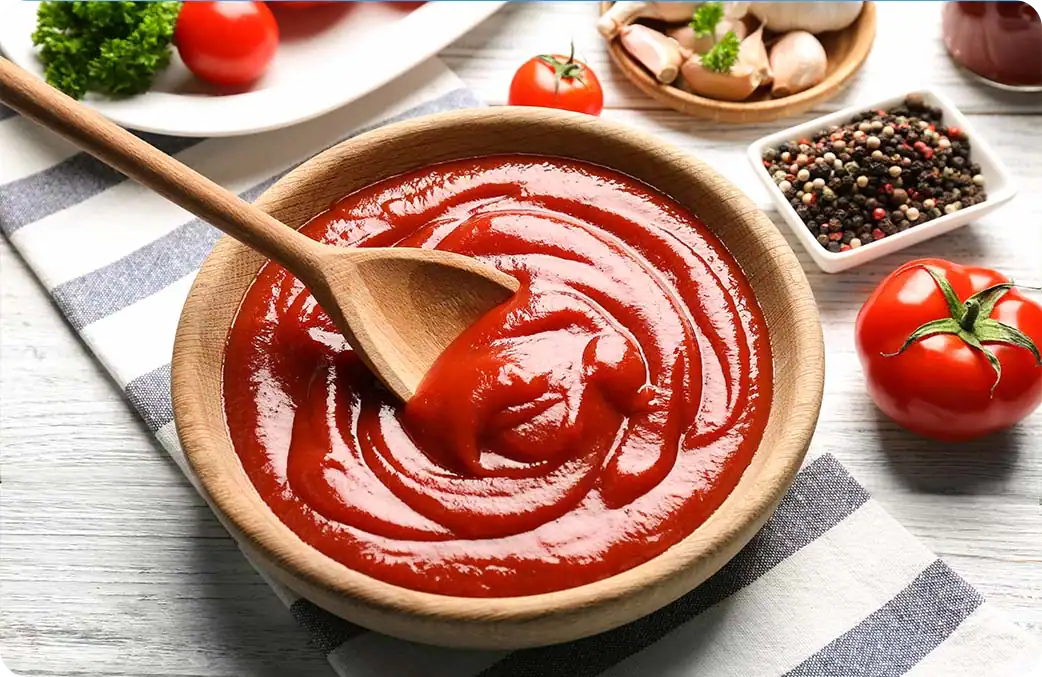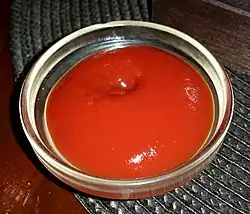What is E1414 The Science Behind the Additive
E1414, also known as Acetylated Distarch Adipate, is a type of modified starch commonly used in the food industry as a thickener, stabilizer, and texture enhancer. It’s made by treating starch with acetic anhydride and adipic anhydride, which changes its molecular structure to improve performance in challenging food processing conditions.
Definition of Acetylated Distarch Adipate E1414
In simple terms, E1414 is starch that has been chemically modified to handle heat, acid, and mechanical stress much better than native starch. This makes it ideal for sauces and condiments that go through processes like high-temperature cooking, pasteurization, and long-term storage.
Chemical and Functional Properties
- Highly stable in acidic environments such as tomato-based products
- Resists heat breakdown, maintaining viscosity after cooking
- Prevents water separation (syneresis) during storage
- Improves texture, giving a smooth, consistent mouthfeel
- Compatible with other ingredients, such as sugars, salts, and natural flavorings
Regulatory Status Worldwide
E1414 is approved as a safe food additive by major global regulatory bodies:
- FDA (USA) – Recognized as safe for use in foods under specific manufacturing practices
- EFSA (European Union) – Evaluated and approved within established Acceptable Daily Intake levels
- Also permitted in Canada, Australia, New Zealand, and many Asian markets under Codex Alimentarius guidelines
Why It Is Preferred in Tomato Ketchup and Seasoning Sauces
Manufacturers choose E1414 for ketchup and sauces because:
- It keeps thickness and smoothness even after shipping and storage
- It withstands high acidity from tomatoes and vinegar without breaking down
- It helps sauces stay uniform and stable without separation
- It supports consistent color and appearance, which matters for consumer appeal
E1414’s combination of stability, heat resistance, and smooth texture makes it a go-to choice for delivering the quality consumers expect while keeping production efficient.
Functional Benefits of E1414 in Tomato Ketchup and Seasoning Sauces
E1414, also known as acetylated distarch adipate, is a modified starch that plays a big role in keeping ketchup and seasoning sauces smooth, stable, and consistent. It’s one of those behind-the-scenes ingredients that make a big difference without changing the flavor.
Thickening and Stabilizing Properties
- Gives ketchup and sauces a consistent thickness, so they don’t end up watery.
- Helps prevent separation during storage and transport.
- Keeps texture uniform from the first pour to the last drop in the bottle.
Improving Texture and Shelf Life Stability
- Creates a silky, smooth mouthfeel that people expect from quality ketchup.
- Slows down texture changes over time, extending shelf life.
- Reduces the risk of clumps or gel-like chunks forming.
Resistance to Heat and Acid in Ketchup and Sauces
- Stays stable during cooking, boiling, or pasteurization.
- Handles the natural acidity of tomatoes and vinegar without breaking down.
- Perfect for hot-fill bottling processes used by many U.S. manufacturers.
Impact on Taste and Appearance
- Doesn’t add any flavor, so the original taste profile stays true.
- Keeps the bright, appealing color of tomato ketchup intact.
- Improves product shine and consistency for an attractive, premium look.
| Benefit | How it Helps in Ketchup & Sauces |
|---|---|
| Thickening | Consistent pour and texture |
| Stabilizing | Prevents ingredient separation |
| Heat resistance | Maintains texture in high-temp cooking |
| Acid resistance | Withstands tomato and vinegar acidity |
| Appearance | Enhances color and shine |
| Flavor neutral | No impact on taste |
Market Price of E1414 Understanding Costs in USD
The market price for E1414 (Acetylated Distarch Adipate) can shift depending on several factors, but in recent years, U.S. import prices have generally ranged between $1,800–$2,500 USD per metric ton for food-grade quality, with variations based on supplier contracts and volume. Prices are often negotiated for bulk orders, especially for manufacturers producing large batches of tomato ketchup and seasoning sauces.
Factors Affecting Pricing
- Production Costs – Energy prices, manufacturing processes, and labor all play a role.
- Raw Materials – Corn, tapioca, or potato starch availability can impact costs.
- Supply Chain & Logistics – Ocean freight rates, global shipping congestion, and customs fees influence landed costs in the U.S.
- Regulatory Compliance – Meeting FDA and international food safety standards adds to production expenses.
Impact on Ketchup and Sauce Prices
When E1414 costs rise, manufacturers may face higher production costs for ketchup and sauces since this additive helps ensure thickness, stability, and shelf life. Even small cost shifts can impact retail pricing, especially for large-scale producers dealing with tight margins.
Bulk Buying and Sourcing Considerations
- Volume Discounts – Ordering larger quantities can reduce unit costs.
- Long-Term Contracts – Helps lock in predictable pricing and secure steady supply.
- Local vs. Overseas Supply – U.S.-based distributors may offer faster delivery, while overseas suppliers might offer a lower base price but with longer lead times.
- Quality Assurance – Always source certified food-grade E1414 to meet safety and labeling laws.
For more insights into its usage in sauces, see how E1414 works in tomato ketchup and seasoning sauces.
Sourcing and Quality Considerations for E1414
When it comes to E1414 (Acetylated Distarch Adipate), not all suppliers are the same. In the U.S. market, where food safety standards are strict and customer trust is everything, it’s important to know exactly how to evaluate your source.
How to Evaluate E1414 Suppliers
To make sure you’re getting consistent, food-grade quality, look for suppliers who:
- Provide clear documentation like Certificates of Analysis (COA) and Safety Data Sheets.
- Have recognized certifications such as FDA compliance, HACCP, or ISO quality systems.
- Offer batch consistency so your ketchup or seasoning sauce production doesn’t change from order to order.
- Maintain a transparent supply chain, including sourcing details for starch base materials.
Importance of Certified and Food Grade E1414
Only certified, food-grade E1414 is safe for use in tomato ketchup and seasoning sauces. Top-quality modified starch ensures:
- Safety and compliance with U.S. and international standards.
- No unwanted contaminants or substandard processing.
- Reliable performance in heat, acid, and long shelf life applications.
Taichy Food’s Approach to Quality Sourcing
At Taichy Food, we source premium, food-grade E1414 directly from trusted manufacturers who meet strict safety regulations. Our process includes:
- Vendor audits to verify production standards.
- In-house testing to confirm thickness, stability, and purity.
- Maintaining stable inventory for consistent pricing and supply reliability—critical for U.S. manufacturers who need predictable costs.
By securing a trusted supply, manufacturers can keep their ketchup and seasoning sauces consistent in texture, taste, and stability—batch after batch.
Impact of E1414 Costs on Tomato Ketchup and Seasoning Sauces Production
E1414 (Acetylated Distarch Adipate) might only be a small part of a ketchup or seasoning sauce recipe, but its cost can still influence the total production cost—especially for large-scale manufacturing in the U.S.
Cost Breakdown in Production
While the bulk of production costs go to ingredients like tomatoes, sugar, vinegar, and packaging, food additives like E1414 still take a noticeable slice when purchased at high volumes. On average, E1414 can account for 2–4% of the total ingredient cost in ketchup or seasoning sauces, depending on its dosage rate and supplier pricing in USD. For private label manufacturers, even small price shifts can add up quickly across thousands of units.
Cost Control Strategies Manufacturers Use
To keep costs stable without hurting product quality, manufacturers often:
- Negotiate bulk contracts with E1414 suppliers for better rates.
- Source from multiple suppliers to avoid sudden shortages or price spikes.
- Optimize dosage levels to maintain stability and texture without overuse.
- Choose food-grade suppliers with consistent spec quality to reduce waste or rejected batches.
Example Scenario
A regional U.S. sauce manufacturer producing 500,000 bottles of tomato ketchup annually uses 0.3% E1414 per batch. If the price of E1414 increases by just $1 USD per kilogram, total yearly costs can rise by several thousand dollars—enough to impact retail pricing or margins. By locking in a 12-month supply contract with a trusted supplier, they are able to avoid these fluctuations and maintain price stability in the market.
Regulatory and Consumer Trends Influencing E1414 Usage and Costs
International regulations on food additives including E1414
E1414, also called acetylated distarch adipate, is allowed for food use in many countries, including the United States, the EU, and parts of Asia. The FDA lists it as a safe modified starch when used within approved limits. In Europe, EFSA assigns it an E-number (E1414) and sets clear guidelines on how much can be used in products like tomato ketchup and seasoning sauces. Australia and New Zealand also permit it under their food standards code. These rules are designed to ensure product safety and consistency for consumers worldwide, but they do differ slightly between regions—which can impact sourcing and pricing.
Consumer shift toward clean label and natural ingredients
Across the U.S., more shoppers are reading ingredient labels and leaning toward products with “simple” or “natural” listings. This has pushed some sauce brands to either cut back on or replace modified starches like E1414 with alternatives. However, for many large-scale ketchup and sauce makers, E1414 remains an important tool because of its stability in heat, acid, and long storage. The trade‑off between performance and the “clean label” trend is influencing how much E1414 is used, as well as the need to highlight quality sourcing and safety in marketing.
Future trends and innovations in food additives for sauces
In the coming years, we can expect:
- More GMO‑free and organic starch options to meet clean‑label goals.
- New modified starch blends that combine E1414’s performance with a “natural” image.
- Improved supply chain transparency so buyers can track sourcing and quality.
- Advances in plant-based ingredient tech that may reduce reliance on traditional modified starches.
Why Choose Taichy Food for Your E1414 Needs

When it comes to sourcing E1414 (Acetylated Distarch Adipate) for tomato ketchup and seasoning sauces, we know U.S. manufacturers expect quality, fair pricing, and steady supply. That’s exactly what we deliver at Taichy Food.
Our Commitment
| What We Offer | Why It Matters for You |
|---|---|
| Consistent Quality | Every batch meets food-grade safety standards and passes strict inspections. |
| Price Transparency | Clear USD pricing with no hidden fees so you can plan costs easily. |
| Reliable Supply | Strong inventory management to avoid production delays. |
Technical Support and Consultation
We don’t just ship product—we help you get the most out of it. Our team can:
- Recommend the right E1414 grade for your ketchup or sauce formula.
- Provide blending and usage advice to avoid texture issues.
- Assist with meeting FDA and other compliance requirements in the U.S.
Proven Customer Success
Many U.S. ketchup and sauce producers count on Taichy Food for stable E1414 supply. They’ve improved texture consistency, extended shelf life, and kept production costs under control—all while maintaining flavor.
FAQs
What is E1414 used for in tomato ketchup?
E1414, also known as acetylated distarch adipate, is mainly used in ketchup to keep it smooth, thick, and stable. It stops the sauce from separating over time and helps it handle the heat during cooking and the acidity from tomatoes.
How does E1414 affect the taste and texture?
It doesn’t add any flavor, so the taste stays the same. The main change is in texture — ketchup feels richer, more uniform, and it pours consistently without being too runny or clumpy.
Is E1414 safe according to global food safety authorities?
Yes. It’s approved by major regulatory bodies like the FDA in the U.S. and EFSA in Europe. It’s considered safe when used within standard food manufacturing limits.
How can I buy E1414 from Taichy Food?
You can reach out to Taichy Food’s sales team directly for a quote in USD. We can supply in bulk, provide food-grade quality certificates, and arrange shipping anywhere in the U.S.
Can E1414 prices fluctuate significantly? Why?
Yes, prices can shift based on raw material costs, global starch supply, shipping rates, and changes in food additive regulations. Buying in bulk or securing long-term supply contracts often helps stabilize pricing.


